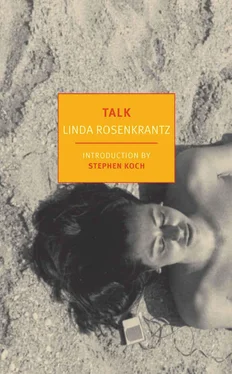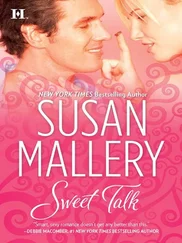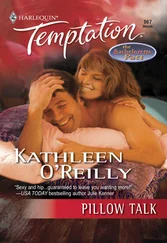EMILY: No, not compassion, because compassion is to a certain extent identification and a kind of tolerance. This was feeling that my blood wasn’t the blood that made up Emily Benson and the cells that were all locked inside her life; it was an extension of humanity, like I was part of Marsha, we weren’t separate people, we were all part of each other, somehow sliced off by maybe a knife.
VINCENT: Right.
EMILY: But that everything was touching and I was intimately a part of every pulsebeat of every sun that came up on everybody’s life. There was a huge opening of the sky, I saw God, I had a tremendously mystical experience. I was deeply moved, deeply in love. And when I say love, it’s not like on the level we know from analysis. It was the absence of all anger, the absence of all conflict.
VINCENT: But that’s what you’re working toward in analysis.
EMILY: No no no, that’s not what you get from analysis. Analyzed love is not the absence of all those things, it’s after dealing with them. Under LSD, they didn’t even exist. You see it wasn’t a love in which there was present such-and-such, but rather an absence of anger, of aggression, of conflict, of identification, of need, of unfulfillment, of frustration — all those things we feel go into love, because love is based on so much else. I don’t think love is some kind of pure fucking quality, you know. Actually, the only thing that comes close to expressing the kind of feeling I had is “Seymour, an Introduction” by Salinger, that’s the only thing that approaches it. It has nothing to do with thinking things out. It’s like if you’re in a warm bath, your reality is that the body is in warm water.
VINCENT: I know.
EMILY: Yeah, you get it, darling.
VINCENT: But I think you can also arrive there in other ways.
EMILY: I’ve been there, but only under the most extraordinary circumstances, the most temporal.
VINCENT: After you come down, is the experience very meaningful? In other words, do you think I should take the trip?
EMILY: The LSD trip? I don’t know, a lot of people have asked me that. I’ll tell you, Vinnie, the experience was fantastically extraordinary, and I would never undo it.
VINCENT: That’s good.
EMILY: I would never undo it, but I would never tell you to do it.
VINCENT: I’d be afraid of the cataclysm, the black depression coming in on me. I’ve had enough of that.
EMILY: I had blackness then like I’ve never known blackness in my life, because when I started coming down, and I saw I’d written all over Philippe’s body and on the walls with a ballpoint pen This stone is love, God is in this pebble , and I really knew when I wrote it what the fuck I was talking about, and then I started to come down and I said who wrote this?
VINCENT: Oh my poor darling.
EMILY: And all of a sudden I said my mind, I’m losing my mind. There’s nothing more frightening. Like no matter how drunk you are, how insane, there’s always some core that you know in yourself to be you?
VINCENT: Right. And you lost that.
EMILY: And that went. But if you could take it with a doctor, then I’d say definitely take it.
VINCENT: Actually, truth is both those things, you’ve got to accept both that huge love and the total absence. One is no more true than the other.
EMILY: You know I’m not at all sure, Vinnie — this is a very strange thing I’m coming to — I’m not at all sure that the way it’s worked out socially, in terms of civilization, I’m not so sure that men and women can love each other and grow families, that naturally these things work out.
VINCENT: Civilization is completely artificial, I’ve always said that.
EMILY: The working out of structure is a decision and civilization surviving is a decision.
VINCENT: And even love isn’t natural.
EMILY: I’m not sure it is. Not that it’s strictly synthetic, but I’m not sure it’s a built-in thing, that whole marriage system of society our lives are based on. Even yours.
VINCENT: Is it out of your LSD you’re talking now or are you jumping?
EMILY: I’m jumping.
VINCENT: Oh, jumping. Because I don’t want to go off into marriage, that’s a whole other discussion. I want to stay on what you learned out of your LSD experience.
EMILY: I’m not a pragmatic person, so I can’t say that it had a use. I only know that the only time I’ve ever gone beyond any point of identity in terms of Emily Benson was then.
VINCENT: But now, when you look at reality, has it made a new imprint on you? Do you see things in a different way? Do you feel more religiosity? I sound like David Susskind.
EMILY: No, but you asked me about the religious part. First of all, in a crazy way, I don’t want to use the word religious, but you know that from my father I have a mystical side to my mind, my nature. And I’ll tell you, Vinnie, the phoniest thing, the Zen koan at the beginning of Catcher in the Rye —I really love Salinger very much, I’m very hooked up with him — it says we know the sound of two hands clapping, what is the sound of one hand clapping? Now that’s a very kind of trite thing, it’s pat, but I really get it and I get all the vibrations. You know I called Marsha up when I was under LSD and she said I was talking pure poetry.
VINCENT: Really?
EMILY: A child is crying in the wall. You know the idea that flowers cry when they’re picked? Well the sensitivity was so great that if the flower was picked, I could hear it crying. I didn’t identify with the flower, I was the flower. And it wasn’t like I’m such a sensitive person or anything, it was simply that the power or the chemistry of the mind reached a certain level. I remember pouring a glass of milk, and as I did, I experienced myself being poured into the glass. The milk was part of me, an extension, that’s what I mean by mystical.
VINCENT: Incredible.
EMILY: I shouldn’t really say mystical, because the word evokes a whole mysterious realm of associations, whereas this was absolutely logical. Say for instance right now we both look up: we both see a certain kind of blue sky, a certain kind of star, and it makes a certain kind of sense, so that if we each sat down to paint it, the paintings would correlate to a great degree. But if we both took LSD, the art would instantly change. That’s what pre-Columbian art is all about, you know, because those guys weren’t straight, they were chemically different, and the whole distortion of style was just a reflection of what they saw. The reality of the landscape is completely determined by the people who see it.
VINCENT: Of course.
EMILY: Like when a madman on the street says get away from me, it’s because he sees a person with a knife trying to kill him. It’s not that he’s a lunatic seeing a mirage; he actually, for his own mind, sees it. It’s completely real. That’s why the word mystical is misleading. You know, Vinnie, I really believe that the nature of the fucking sands would change if the chemistry was a little bit different in all our heads. For instance, if my chemistry was different, I might see that this sand wasn’t sand. Look, I’m going over to it right now, I’m walking to the sand and I’m going to the LSD experience. I’m getting canyons, and these little things that dip in all of a sudden become miles dipping in. The top becomes sunbaked peaks, and these specks become arid plants growing.
VINCENT: No kidding!
EMILY: And the white becomes illusions of clouds floating on top. All kinds of things start to happen if I let my mind go. I don’t associate just sand is sand, like I’ve always seen sand and I know it because I’m secure that that’s sand. All the security is taken away from everything. Suddenly I’ve never really seen sand before — and I haven’t, because my eyes have changed, the retinas.
Читать дальше












